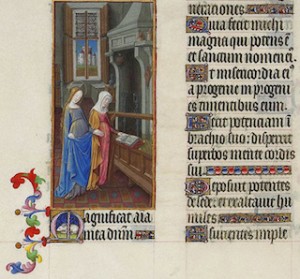Thoughts on Today’s Lessons for Sunday, Dec. 15, 2013
The third Sunday of Advent is called Gaudete (“Rejoice”) Sunday, a pause in the quiet anticipation of Advent to feel joy at the coming celebration of Jesus’s birth. Today’s readings share themes of joy and service, beginning with Isaiah’s prophetic voice of hope for return from exile: “The desert shall rejoice and blossom … rejoice with joy and singing.” This hope of joy is offered specifically to the oppressed, the weak, those who suffer pain … all those who Jesus would call us to serve.
Canticle 15: Luke 1:47-55
Today in place of a Psalm we sing Luke’s Song of Mary. If you think of the mother of Jesus as a sweet, submissive figure, take a closer look at the words this teen-aged Palestinian woman sang when the angel tells her she would be the mother of God: “ … he has scattered the proud … brought down the powerful … lifted up the lowly … filled the hungry with good things … sent the rich away empty.” This divine command links Torah and the Gospels. It is the command that Jesus explicitly asks of those who follow his way.
Second Reading: James 5:7-10
“Be patient, therefore”? What an odd way to begin a reading! Look back a few verses to see what led to this, and we find James – like Mary in the Canticle – excoriating the rich, or more exactly, the selfish rich. “… you rich people, weep and wail for the miseries that are coming to you. … You have laid up treasure for the last days. Listen! The wages of the laborers who mowed your fields, which you kept back by fraud, cry out, and the cries of the harvesters have reached the ears of the Lord of hosts.” Then we get James’s command: Love each other, and be generous with one another, lest we be judged.
Gospel: Matthew 3:1-12
Matthew’s Gospel consistently emphasizes that Jesus is Messiah, the lord and savior whom the prophets foretold. Here he narrates a conversation between Jesus and John the Baptist in prison, invoking an Isaiah prophecy to declare John God’s messenger making straight the way for Jesus. Then Jesus sets out his priorities, which echo his mother’s song: “… the blind receive their sight, the lame walk, the lepers are cleansed, the deaf hear, the dead are raised, and the poor have good news brought to them.”

